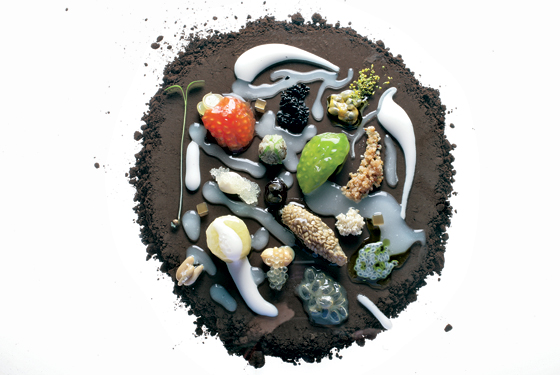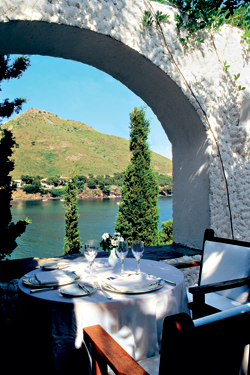
I was there almost by mistake, invited before anyone knew quite how little I know about food. I have never really cooked, don’t know how to use my dishwasher, and subsist mainly on prepared deli takeout. I don’t even eat in restaurants much. Yet here I was, invited to a meal at El Bulli, the Catalonian restaurant of Ferran Adrià. The occasion was a roundtable of art-world muckety-mucks, devoted to the work of the Spaniard widely considered the world’s most inventive chef, a pioneer of the intriguing, mad branch of cuisine known as “molecular gastronomy.” I was the naïf in the room. (Before I was invited, I’d never heard of Adrià or his restaurant.) I was introduced on the panel as “the food virgin.” Ouch.
I was and may still be that, but eating at El Bulli is less dinner than performance art, and that’s something I relate to. Adrià seems to me a Picasso of food, having moved beyond classical cuisine into another realm. (Although to top off the session, he whipped up the best traditional seafood lunch I’ve ever had, remarking, “In order to do what I do, you first have to be able to do this.”) Adrià looks and acts like Picasso too: about the same height and build, with wild dark eyes and palpable sexual energy. I half-expected to see him parading on the beach in his underpants. (Even his restaurant’s name evokes Picasso’s bulls.) The self-taught Adrià makes you understand why there’s never been a 10-year-old prodigy in art or food, unlike music or math. With art and food you need your body; you need knowledge of sex and death. All art penetrates us one way or another, food explicitly.

At least that’s what I was thinking as I consumed—or was consumed by—the multisensual 32-course, four-hour dinner. It was meal as inner and outer spectacle, symphony, journey, rite, and orgy. I barely know what I ate. There were the famous gels and foams. Nothing looked like what it was; nothing tasted like what it looked like. When someone told me what I was eating, I seemed to lose the thread. I kept muttering, “Don’t talk, I can’t taste.”
The first course began a seduction. A straw made of vanilla protruded from a hollow ball of clear ice, so that you sipped the melting water inside. You didn’t taste it so much as it inundated you, like perfume. Eventually there was rabbit ear, tuna marrow, veal tendon, green walnuts, beetroot, water lily, and some kind of inside-out sandwich with ham wrapped around bread. There was fantastic sparkling homemade beer and a martini served in a refitted Comme des Garçons perfume atomizer. Midway through the meal, I was shocked by something called “electric milk Sichuan buttons,” little wafers that may have been baked skeins of cream. They were sprinkled with herbs that anesthetized my mouth. I imagined that this is how insects taste things. Adrià uses every part of every animal and plant and every part of you. Some courses were kitschy, like the “parmesan frozen air with muesli” served in a Styrofoam box. The last course, a chocolate dessert called “autumn landscape,” made me think the meal was too short and that this was the last thing I’d ever eat.
All this control conveys that food, like art, is a language and that Adrià is trying to break down taste to pure components of texture, smell, sight, sound, and chemistry. He takes you to the core of eating, from the meal to the course to the bite all the way down to the swallow. There’s barely any silverware. Art dealer Massimo De Carlo remarked, “I don’t think I used my teeth.” It was like eating in caves.
I couldn’t eat like this often, but I was happy to be deflowered at El Bulli. The meal was like the opening of the Olympics: dazzling but tyrannical. The secret of food lies in memory—of thinking and then knowing what the taste of cinnamon or steak is. Adrià isn’t building sense memories. All I know is I was ravished: When the chef appeared afterward, I felt embarrassed when he looked at me, and jealous because he had done the same thing with other people. Eventually, I understood what my fellow diner, the filmmaker Peter Kubelka, meant when he noted that cooking was the oldest art—once upon a time, after all, kitchen and pharmacy were the same room. Adrià is creating a language for future chefs while conjuring a fantastical alchemy of love, one in which eating, thinking, nourishment, and feeling merge.